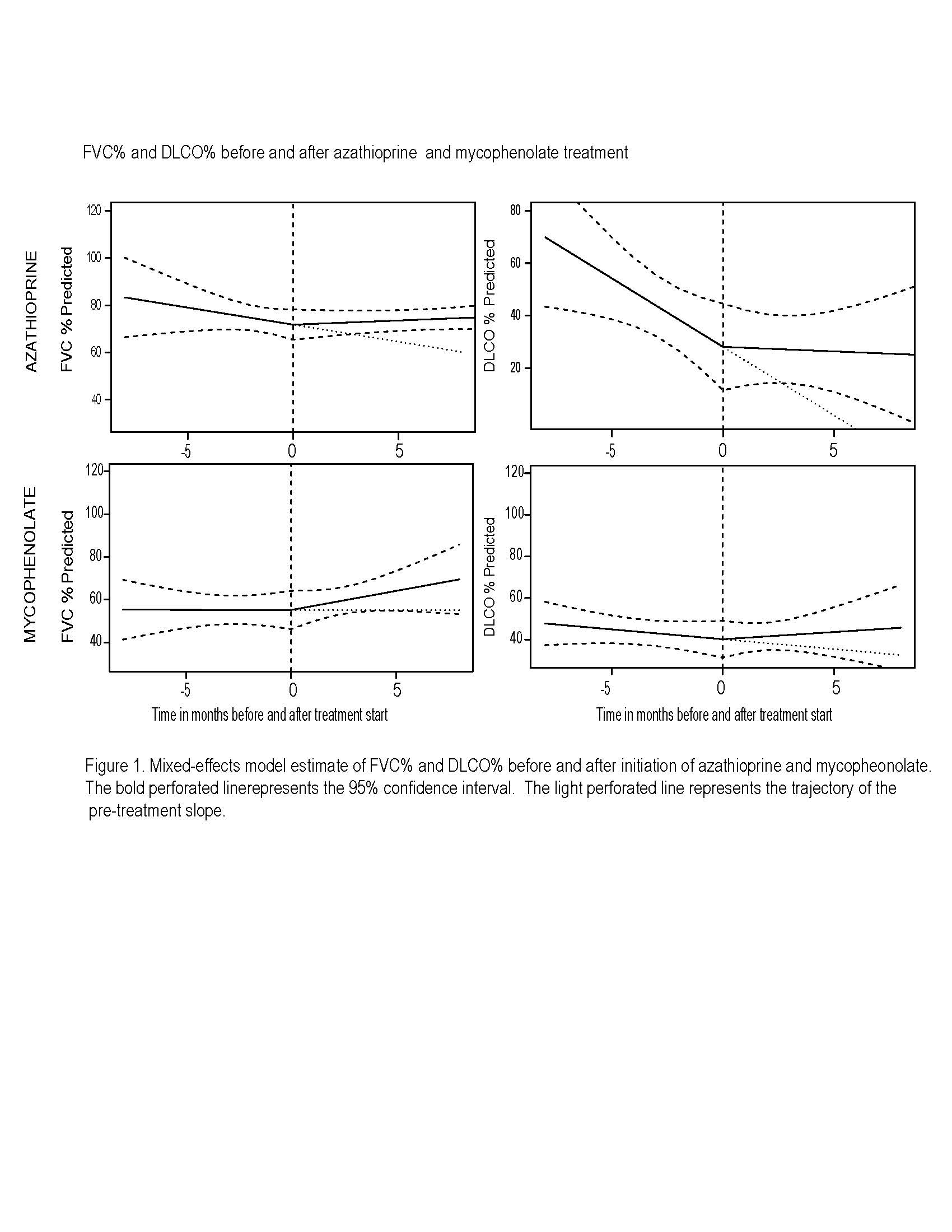Session Information
Session Type: ACR Poster Session B
Session Time: 9:00AM-11:00AM
Background/Purpose: Interstitial lung disease (ILD) is a common extraglandular manifestation of Sjögren’s syndrome (SS). There is a paucity of literature on the management of SS-ILD. The aim of this retrospective cohort study is to assess the efficacy of immunosuppressive therapy in the treatment of adult patients with SS-ILD.
Methods: A retrospective electronic health record search using codes for ILD and SS was performed for patients seen between 2000-2017at an academic medical center. Records were reviewed to include adults meeting the 2016 American College of Rheumatology/European League Against Rheumatism classification criteria for SS and to exclude those with other connective tissue diseases. ILD was confirmed by characteristic CT pattern or histopathology findings. Sociodemographic, clinical, and pulmonary function test (PFT) data were abstracted for patients with and without azathioprine, mycophenolate, and rituximab treatment and followed longitudinally from the date of ILD diagnosis. PFT values were anchored (T0) on time of treatment start. Linear mixed-effects modeling and paired t-tests were used to analyze changes in diffusion capacity for carbon monoxide (DLCO) and forced vital capacity (FVC) before and after treatment initiation.
Results: We identified 19 subjects who had SS-ILD, of whom 89% were female, with ages ranging from 37-84 years at the time of ILD diagnosis. Seven patients were treated with azathioprine, seven patients were treated with mycophenolate, and six patients were treated with rituximab. Five patients were not treated with immunosuppressive therapy and five patients were treated with more than one agent. Within the azathioprine group, paired t-test showed a significant improvement in FVC% after treatment was initiated (p=0.01) with mixed model effect similarly showing improvement although with a non-significant change in slope (p=0.22) (Figure 1). A trend toward improvement in slope was also seen in DLCO% after treatment with azathioprine (p=0.16). Similarly, among those treated with mycophenolate, there was a trend toward improvement in slopes of both FVC% and DLCO% (FVC% p=0.4, DLCO% p=0.45), although these did not reach statistical significance (Figure 2). Among those patients treated with rituximab, there was a post-treatment decline in FVC% and DLCO%, although only three patients had PFTs measured before and after treatment.
Conclusion: Azathioprine appears to improve PFTs of SS-ILD patients and a similar non-significant trend is seen after mycophenolate treatment. Further prospective studies are needed to further evaluate these findings.
To cite this abstract in AMA style:
Amlani B, Barvalia U, Ahmed Elsayed GM, Kanne JP, Li Z, McCoy SS. Azathioprine and Mycophenolate for Management of Sjögren’s Syndrome-Related Interstitial Lung Disease: A Retrospective Cohort Study [abstract]. Arthritis Rheumatol. 2018; 70 (suppl 9). https://acrabstracts.org/abstract/azathioprine-and-mycophenolate-for-management-of-sjogrens-syndrome-related-interstitial-lung-disease-a-retrospective-cohort-study/. Accessed .« Back to 2018 ACR/ARHP Annual Meeting
ACR Meeting Abstracts - https://acrabstracts.org/abstract/azathioprine-and-mycophenolate-for-management-of-sjogrens-syndrome-related-interstitial-lung-disease-a-retrospective-cohort-study/

